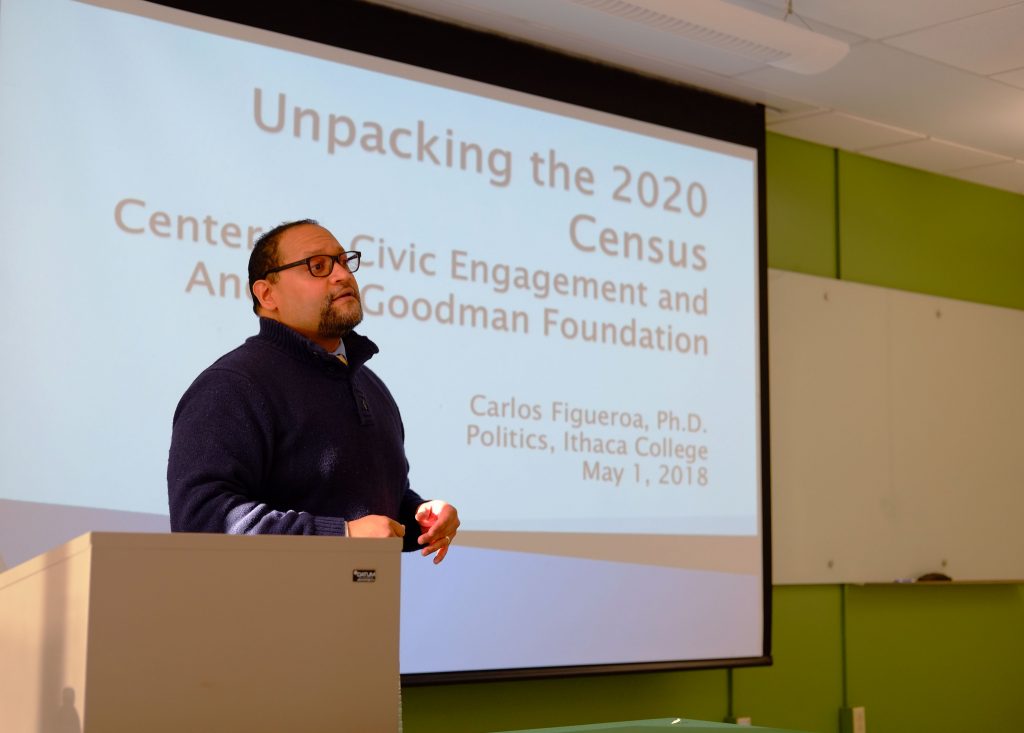
A question regarding citizenship status has not been seen on the United States census since 1950. However, U.S. residents may have to answer it on the next census in 2020.
The U.S. Commerce Department has requested that citizenship status be included on the 2020 census in order to more fairly enforce the Voting Rights Act. In response, the Andrew Goodman Foundation (AGF), an organization with chapters throughout the country that focuses on political activism on college campuses, and Binghamton University’s Center for Civic Engagement (CCE) invited Carlos Figueroa, an assistant professor of politics at Ithaca College, to speak on the possibility of the restoration of this question.
The event, entitled “Unpacking the 2020 U.S. Census,” was held Tuesday evening in the University Union. Figueroa presented on the dangers of including a question about citizenship status, which he claimed could lower response rates and hurt communities.
Data from the census helps determine where local and federal governments build facilities, such as hospitals and schools, and the funding allocated to them. According to Figueroa, with an inaccurate census, resources may not be allocated in the most efficient way possible.
“It’s something that we should take seriously from a civic perspective,” Figueroa said. “Along with voting and political participation, more generally, responding to these kinds of surveys and questionnaires [is important] because they mean that we would then get the kinds of resources that we deserve in all types of communities.”
Samantha Ng, a junior double-majoring in Asian and Asian American studies and human development, is an ambassador team leader for AGF’s Vote Everywhere program, which is co-sponsored by the CCE and aims to register students to vote and get them politically engaged. According to Ng, events like this are important for diverse campuses like BU because people of different backgrounds, like her own family, have different views on the census.
“My parents are immigrants, and I think that they have a different relationship with the U.S. government, within the United States, as other folks may have with different backgrounds,” Ng said.
Yazmeen Marte, an undeclared freshman, said she learned about the census in her WRIT 111 class and came to the event to gain more perspective on its impact on the Latinx community.
“I was kind of researching the Latinx identity, and how the fact that the census has a lot to do with how we identify and how that’s a problem,” Marte said.
At the end of the event, Figueroa touched on ways that students can make their voices heard. He provided a template for calling representatives and discussed a class-action lawsuit filed by New York State Attorney General Eric Schneiderman that aims to take the citizenship question off of the census. The suit, filed on April 3, alleges that asking for a resident’s citizenship status would decrease turnout and lead to inaccurate information, as well as an inaccurate allocation of funds.
Ferdous Dehqan, a Vote Everywhere ambassador and a senior majoring in political science, said his team initially contacted Figueroa and helped organize the talk because they wanted to focus on both education and promoting activism.
“I think it is very important to be [active],” Dehqan said. “It could be just doing volunteering at the college level or university level or student clubs, public rallies or by calling and texting our elected officials.”


